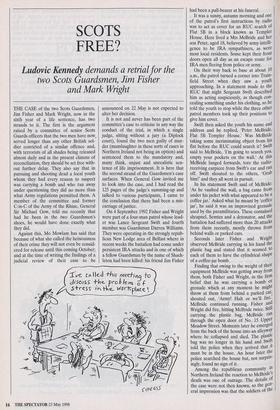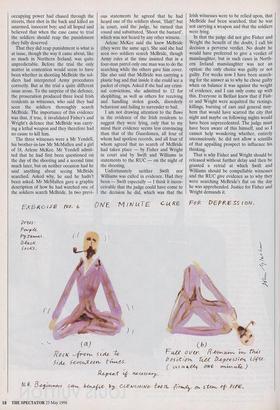SCOTS FREE?
Ludovic Kennedy demands a retrial for the
two Scots Guardsmen, Jim Fisher and Mark Wright
THE CASE of the two Scots Guardsmen, Jim Fisher and Mark Wright, now in the sixth year of a life sentence, has two strands to it. The first is the argument raised by a committee of senior Scots Guards officers that the two men have now, served longer than any other British sol- dier convicted of a similar offence and, with terrorists of all shades being released almost daily and in the present climate of reconciliation, they should be set free with- out further delay. They also say that in pursuing and shooting dead a local youth whom they had every reason to suspect was carrying a bomb and who ran away under questioning they did no more than what Army regulations permitted them. A member of the committee and former C-in-C of the Army of the Rhine, General Sir Michael Gow, told me recently that had he been in the two Guardsmen's shoes, he would have done exactly what they did.
Against this, Mo Mowlam has said that because of what she called the heinousness of their crime they will not even be consid- ered for release until this coming October; and at the time of writing the findings of a judicial review of their case to be announced on 22 May is not expected to alter her decision.
It is not and never has been part of the committee's case to criticise in any way the conduct of the trial, in which a single judge, sitting without a jury (a Diplock court), found the two men guilty of mur- der (manslaughter in these sorts of cases in Northern Ireland not being an option) and sentenced them to the mandatory and, many think, unjust and unrealistic sen- tence of life imprisonment. It is here that the second strand of the Guardsmen's case surfaces. When General Gow invited me to look into the case, and I had read the 125 pages of the judge's summing-up and talked to various participants, I came to the conclusion that there had been a mis- carriage of justice.
On 4 September 1992 Fisher and Wright were part of a four-man patrol whose lead- er was Lance Sergeant Swift and fourth member was Guardsman Darren Williams. They were operating in the strongly repub- lican New Lodge area of Belfast where in recent weeks the battalion had come under persistent IRA attacks and in one of which a fellow Guardsman by the name of Shack- leton had been killed: his friend Jim Fisher had been a pall-bearer at his funeral.
It was a sunny, autumn morning and one of the patrol's first instructions by radio was to act as cover for an RUC search of Flat 5B in a block known as Templer House. Here lived a Mrs McBride and her son Peter, aged 18, believed by army intelli- gence to be IRA sympathisers, as were most local residents. Some kept their front doors open all day as an escape route for IRA men fleeing from police or army. On their way back to base at about 10 a.m., the patrol turned a corner into Train- field Street when they saw a youth approaching. In a statement made to the RUC that night Sergeant Swift described him as acting suspiciously, as though con- cealing something under his clothing, so he told the youth to stop while the three other patrol members took up their positions to give him cover. Swift then asked the youth his name and address and he replied, 'Peter McBride, Flat 5B Templer House.' Was McBride taking some incriminating object from his flat before the RUC could search it? Swift said to McBride, 'I'm going to search you, empty your pockets on the wall.' At this McBride lunged forwards, tore the radio- receiving earpiece from Swift's ear and ran off. Swift shouted to the others, 'Grab him!' and they all went in pursuit.
In his statement Swift said of McBride: `As he vaulted the wall, a bag came from under his jacket with what appeared to be a coffee jar.' Asked what he meant by 'coffee jar', he said it was an improvised grenade used by the paramilitaries. These contained shrapnel, Semtex and a detonator, and the battalion had suffered more than 20 attacks from them recently, mostly thrown from behind walls or parked cars. Seconds later Fisher and Wright observed McBride carrying in his hand the plastic bag and stated that it seemed to each of them to have the cylindrical shape of a coffee-jar bomb. Finding that owing to the weight of their equipment McBride was getting away from them, both Fisher and Wright, in the firm belief that he was carrying a bomb or grenade which at any moment he might throw at them from behind a parked car; shouted out, 'Army! Halt or we'll fire. McBride continued running. Fisher and Wright did fire, hitting McBride twice. Still carrying the plastic bag, McBride ran through the open door of No. 15 UPPer, Meadow Street. Moments later he emerged from the back of the house into an alleyway where he collapsed and died. The plastic bag was no longer in his hand and Swift told the police when they arrived that it must be in the house. An hour later the police searched the house but, not surpris- ingly, found no sign of it. Among the republican community i,11 Northern Ireland the reaction to McBride 'S death was one of outrage. The details of the case were not then known, so the gen- eral impression was that the soldiers of the occupying power had chased through the streets, then shot in the back and killed an unarmed, innocent boy; and all hoped and believed that when the case came to trial the soldiers should reap the punishment they fully deserved.
That they did reap punishment is what is at issue, though the way it came about, like so much in Northern Ireland, was quite unpredictable. Before the trial the only matter in contention would seem to have been whether in shooting McBride the sol- diers had interpreted Army procedures correctly. But at the trial a quite different issue arose. To the surprise of the defence, the prosecution produced three local Irish residents as witnesses, who said they had seen the soldiers thoroughly search McBride. The importance of this evidence was that, if true, it invalidated Fisher's and Wright's defence that McBride was carry- ing a lethal weapon and they therefore had no cause to kill him.
The three witnesses were a Mr Yendell, his brother-in-law Mr McMullen and a girl of 18, Arlene McKee. Mr Yendell admit- ted that he had first been questioned on the day of the shooting and a second time much later, but on neither occasion had he said anything about seeing McBride searched. Asked why, he said he hadn't been asked. Mr McMullen gave a graphic description of how he had watched one of the soldiers search McBride. In two previ- ous statements he agreed that he had heard one of the soldiers shout, 'Halt!' but in court, said the judge, he turned that round and substituted, 'Shoot the bastard', which was not heard by any other witness.
Arlene McKee said she knew McBride (they were the same age). She said she had seen two soldiers search McBride, though Army rules at the time insisted that in a four-man patrol only one man was to do the searching while the others gave him cover. She also said that McBride was carrying a plastic bag and that inside it she could see a packet of crisps. Asked if she had any crimi- nal convictions, she admitted to 12 for shoplifting, as well as others for receiving and handling stolen goods, disorderly behaviour and failing to surrender to bail.
I am not drawing attention to the flaws in the evidence of the Irish residents to suggest they were lying, only that to my mind their evidence seems less convincing than that of the Guardsmen, all four of whom had spotless records, and all four of whom agreed that no search of McBride had taken place — by Fisher and Wright in court and by Swift and Williams in statements to the RUC — on the night of the shooting.
Unfortunately neither Swift nor Williams was called in evidence. Had they been — Swift especially — I think it incon- ceivable that the judge could have come to the decision he did, which was that the Irish witnesses were to be relied upon, that McBride had been searched, that he was not carrying a weapon and that the soldiers were lying.
In that the judge did not give Fisher and Wright the benefit of the doubt, I call his decision a perverse verdict. No doubt he would have preferred to give a verdict of manslaughter, but in such cases in North- ern Ireland manslaughter was not an option: the only choice was guilty or not guilty. For weeks now I have been search- ing for the answer as to why he chose guilty when on balance it was against the weight of evidence, and I can only come up with this. Everyone in Belfast knew that if Fish- er and Wright were acquitted the riotings, killings, burning of cars and general may- hem that would have scarred the city that night and maybe on following nights would have been unprecedented. The judge must have been aware of this himself, and so I cannot help wondering whether, entirely unconsciously, he did not allow a scintilla of that appalling prospect to influence his thinking.
That is why Fisher and Wright should be released without further delay and then be granted a retrial at which Swift and Williams should be compellable witnesses and the RUC give evidence as to why they were searching McBride's flat on the day he was apprehended. Justice for Fisher and Wright demands it.



































































 Previous page
Previous page